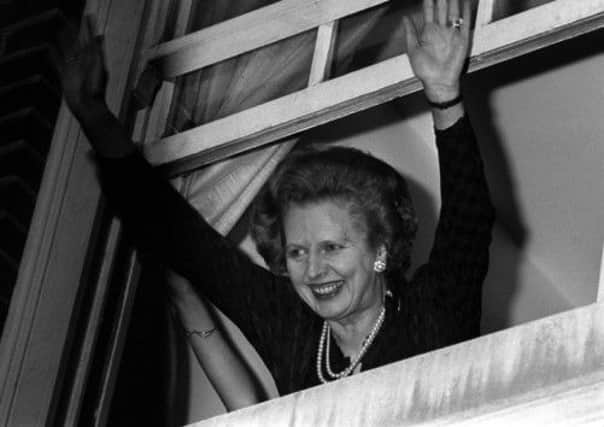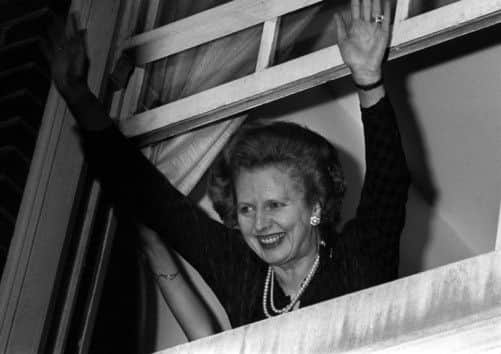The Thatcher Years: A Yorkshire Post special programme


Sir Bernard, a Yorkshire Post columnist, is filmed in conversation with Jonathan Reed.
Click the screen to watch this special presentation.
Margaret Thatcher was the woman who, virtually single-handed and in the space of one tumultuous decade, transformed a nation.


Advertisement
Hide AdAdvertisement
Hide AdIn the view of her many admirers, she thrust a strike-infested half-pace Britain back among the front-runners in the commanding peaks of the industrial nations of the world.
Her detractors, many of them just as vociferous, saw her as the personification of an uncaring new political philosophy known by both sides as Thatcherism.
Tireless, fearless, unshakeable and always in command, she was Britain’s first woman Prime Minister - and the first leader to win three General Elections in a row.
Mrs Thatcher, who became Baroness Thatcher, resigned as Prime Minister in November 1990 after a year in which her fortunes plummeted.
Advertisement
Hide AdAdvertisement
Hide AdIt was a year in which she faced a series of damaging resignations from the Cabinet, her own political judgments were publicly denounced by her own colleagues, catastrophic by-election humiliations, internal party strife, and a sense in the country that people had had enough of her after 11 years in power.
But history will almost certainly proclaim her as one of the greatest British peacetime leaders.
Her supporters believe she put the drive back into the British people.
And as she transformed the nation - attempting to release the grip of the state on massive industries and public services alike - she strode the earth as one of the most influential, talked-about, listened-to and dominant statesmen of the Western world.
Advertisement
Hide AdAdvertisement
Hide AdWhen Argentina invaded the Falklands, she despatched a task force to the South Atlantic which drove the enemy off the islands in an incomparable military operation 8,000 miles from home.
She successfully defied Arthur Scargill’s nationwide and year-long miners’ strike, which threatened to cripple Britain’s entire economic base.
Her triumphant achievement of power in May 1979 signalled the end of the era when trade union leaders trooped in and out of 10, Downing Street, haggling and bargaining with her Labour predecessors.
Instead she stripped the unions of many of their powers with the aim of transferring them to managements and individual consumers.
Advertisement
Hide AdAdvertisement
Hide AdWithin weeks of her arrival in Downing Street, foreign correspondents from all points of the globe - absent for so long from the House of Commons - flocked back to the press gallery. It was a sure sign that the world was sitting up and listening once again to what Britain had to say.
Sir Denis, as he became after she left Downing Street, was constantly at her side, an impeccable consort, protecting her and guiding her in all weathers and in all parts of the world.
He was a wonderful source of encouragement and comfort to her when, as sometimes happened, she returned home in tears after a particularly gruelling day. He made no attempt to disguise his contempt for those who opposed his wife, but he never got involved publicly in policy or political discussions.
His death came at a time when Margaret Thatcher’s own health - she was ten years younger than him - was the subject of speculation. She had suffered a series of strokes and her doctors had forbidden her to make any more speeches - instructions which she was occasionally known to breach.
Advertisement
Hide AdAdvertisement
Hide AdSir Denis’s death was a massive blow to Lady Thatcher. But there was more grim trouble ahead.
Her son, Sir Mark - he inherited the baronetcy from his father - was charged in South Africa in connection with a plot to overthrow the Government of oil-rich Equatorial Guinea. The charge carried a maximum penalty of 15 years, and possible death if Sir Mark was extradited to Equatorial Guinea.
The news broke when Lady Thatcher was on holiday in the United States. She doted on her son and the charge plainly devastated her.
She marked her decision to quit with the historic expression: “It’s a funny old world” - pointing out that she had been summarily removed from power even though she had won every election she had fought.
Advertisement
Hide AdAdvertisement
Hide AdSome of her friends believed that her decision to go to Paris, rather than remain in Westminster, during that first fateful ballot, demonstrated an arrogance and a misjudgment which may well have cost her those crucial handful of votes which would have kept her in Downing Street. If she had received just four more votes, there would have been no need for a second ballot.
But there was no let-up in her energetic activities once she arrived in the House of Lords. She remained a ferocious critic of the European Union, and led a crusade in the Upper House against the Maastricht Treaty.
She was accused, as well, of attacking her successor, John Major, in the same way that her predecessor, Sir Edward Heath, had constantly criticised her when she was in power. But her strictures on John Major did not carry the bitterness and resentment of Heath’s criticisms of her.
Years later, she was to be praised by two Labour Prime Ministers, Tony Blair and Gordon Brown, both of whom invited her into Downing Street soon after they came to power. These were events which enraged some factions in the Labour Party.
Advertisement
Hide AdAdvertisement
Hide AdBaroness Thatcher maintained a gruelling programme of lecture tours worldwide, showing little, if any, sign of slowing down her scorching pace. But there were moments when her stamina and health came into question.
Once, in 1994, she collapsed in the middle of a speech in Santiago, Chile. but she shrugged off warnings from her friends that she should start to take things more easily.
And later that year, her friends were shocked at her gaunt and haggard aspect, three days before her 69th birthday, when she made a token appearance on the platform of the Tory Party conference in Bournemouth.